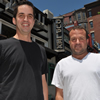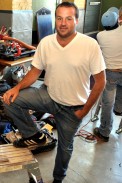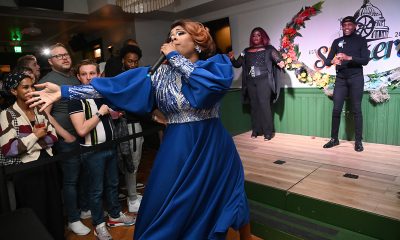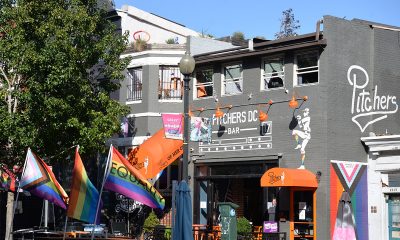Opinions
Duplex Diner pioneer hands over the keys
Hirshfield sparked an ongoing renaissance on high-profile block


Eric Hirshfield opened the 18th & U Duplex Diner in June 1998, which quickly caught on with gay patrons who dubbed it the ‘Cheers for Queers.’ (Blade photo by Michael Key)
Eric Hirshfield, the founder and now former owner of 18th & U Duplex Diner, has proven to be, above all else, a gracious and dedicated gentleman entrepreneur.
His recent announcement that he had sold the business spread like a wildfire among the Duplex’s network of neighborhood patrons and gay community movers-and-shakers alike. An appropriate reaction for a venue attracting a bevy of local gay men and lesbians and their friends where a portion of deceased LGBT and AIDS activist and Clinton administration official Bob Hattoy’s ashes are kept in a martini shaker on a shelf behind the bar.
Following a 13-year anniversary “BAR mitzvah” celebration on June 25 heralding a month-long closure to “refresh” the venue and after a series of weekly “Road Trip” signature Thursday night events currently underway at neighboring establishments, long-time Duplex Diner bartender and new owner Kevin Lee will re-open the venue at the end of the month and continue the popular and well-regarded landmark enterprise.
Referring to his decision to quit his job sporting a pocket protector as a civil engineer to open a community restaurant and bar “a seduction” that began three years prior to the Duplex Diner’s June 1998 opening, Hirshfield jokes that the hospitality industry is the “world’s second oldest profession” — if not the first.
Like a teenager constantly riding his bike down the street in front of a cute neighbor boy’s house, Hirshfield would walk by the abandoned property just north of 18th and U streets at the intersection with Florida Avenue, N.W., on the way home from his downtown office, pressing his face against the glass and dreaming of what it would be like to feel passion, excitement and commitment in his professional life.
It didn’t matter to him that the object of his affection was more than a little rough around the edges. In fact, the conjoined structures at 2002 and 2004 18th St. had seen better days. The weeds inside the building would grow to the height and thickness of trees in the summer and the hollow shell was rapidly deteriorating.
As a young man intent on chasing his desires, Hirshfield threw caution to the wind and told himself that this was the moment to make his move.
Disapproving neighbors
But the challenges involved in consummating such a relationship in the District often prove to be a cruel mistress, indeed.
Despite the fact that he was proposing to rehabilitate a prominent eyesore located at the southern gateway to the Adams Morgan neighborhood where it rubbed shoulders with Dupont Circle, a small group of area residents was quick to disapprove of this new prospective venture.
In a scene re-enacted to this day across the city, they insisted on intervening in this affair. They knew that local tradition allowed them the opportunity to interrupt the courtship and bestowed upon them the potential to call the whole thing off.
Several years later, Hirshfield would join with hundreds of other local business owners in opposition to small citizens groups and Advisory Neighborhood Commission (ANC) members advocating even more onerous restrictions on local businesses, describing the nearly two-year-long ordeal he had endured under the city’s cumbersome alcohol licensing process.
First testifying before the D.C. Council in 2004 during public hearings on the proposed Alcoholic Beverage Control (ABC) law revisions, Hirshfield captured the attention of city officials by detailing the outlandish elements of a lengthy so-called “Voluntary Agreement” he was forced to sign with a small group of liquor license protestants in order to move forward with his contingency lease and property renovation, eventually opening for business.
The document stipulated, among other things, the hours he could open the front windows facing the steady stream of buses, cars and trucks filling this major transportation artery and commercial intersection lest his patrons generate too much noise. It dictated the exact location of his trash containers and required that he install an “airlock” double entrance chamber leading into the small 1,000 square foot establishment.
Confessing his ‘sins’
Council members sat up in their seats in rapt attention as Hirshfield freely “confessed his sins” and announced in a characteristically devilish manner that he was in violation of a number of these stipulations.
His only defense: common sense.
Plus the fact no one had noticed, owing to the reality that these intrusive and nonsensical requirements clearly provided no real or ongoing benefit to those complaining about imagined problems in advance of their existence. Hirshfield learned first-hand that local hospitality business operators in Washington are deemed “guilty” until proven “innocent” in the eyes of the few neighborhood nannies necessary to manipulate and abuse the regulatory system and impose their will with ease, regardless of the actual merit or fairness of their supposed concerns.
Hirshfield went on to illustrate how the arbitrary sales percentage requirements dictating the amount of revenue derived from alcohol vs. food sales are counterintuitive to his business model as both a small neighborhood restaurant and bar.
Explaining that his patrons could order an entire homestyle meal for which the restaurant operation was well-known – with signature dishes like meatloaf and mac ‘n cheese and its popular tater tot side, of which a large number of patrons are worried will not make the new menu version (they will) – for a modest price, Hirshfield totaled the cost of an adult beverage with the meal and, heaven forbid, another drink (or two) at the bar either before or after.
A guest enjoying the evening and visiting with friends was, in fact, making it harder for the business to comply with the law the longer they hung around. All this despite the patron wanting to support this community business and help it succeed.
Although providing a robust and popular neighborhood eatery serving a wide swath of local demographics — Hirshfield often describes the actual bar top as being “not a gay bar, not a straight bar, but a curved bar” which, in fact, it is, and will remain — to this day the business struggles, along with many others, to meet these abstract revenue formulas.
Unintended consequences
Hirshfield’s impassioned public articulateness regarding the issues facing local community small business owners over the years has helped create a virtual industry standoff with alcohol licensing opponents. These efforts have contributed to a growing understanding among city residents that the entire license approval process has remained seriously out of whack.
Looking back on the licensing process he underwent, Hirshfield said that his naiveté was his most advantageous attribute, along with persistence and tenacity — otherwise, he might have just given up. After all, he now reflects, a rational businessperson would have simply moved on.
And therein lies the rub. For all the grousing about unruly crowds and late-night drunken revelers clutching pizza slices at the end of a weekend night overwhelming the sidewalks and spilling onto the streets of Adams Morgan, it is the extraordinarily obtuse and out-of-balance licensing process that discourages both sanguine and successful hospitality industry players from locating in the area.
Cumbersome licensing obstacles and hostile regulatory hoop-jumping required by groups such as the long-notorious Kalorama Citizens Association (KCA) and its miniscule active membership are the creators of these unintended consequences, according to Hirshfield. Add the small ad hoc license protest groups formed to oppose local business applicants along with neighborhood ANCs all too eager to extract their own pound of flesh — all wielding what he refers to as an “Involuntary Agreement” as their weapon of choice and demanding acquiescence to their demands — and soon seasoned and savvy community business operators begin looking elsewhere.
Hirshfield contends that it is these licensing opponents who have, in fact, “manifested what they sought to eliminate.”
Without a marketplace mix of hospitality businesses contributing to each other’s success and providing a blend of offerings, Hirshfield argues, those operating on the edges resort to cheap drinks, plastic cups, and college-age promotions to reap volume sales, larger margins and the ability to pay the bills.
Hirshfield points out — from his perspective as a neighborhood resident, consumer and business owner — that the diverse neighborhood enjoys a long tradition as host to a broad range of responsible establishments and a rich history offering an eclectic mix of cuisines and environments and continues to be a vibrant destination for well-regarded dining and entertainment options.
He believes that the neighborhood’s best days are yet ahead, and that the community will successfully confront the problems it is currently experiencing as a result of the misguided policies of the past.
You might think that a business owner would fear the presence of alternatives in close proximity or be concerned with competition from other establishments.
Not the case in Hirshfield’s mind, as he is quick to point out the long-time contribution that the also gay-owned L’Enfant Café and Bar French-inspired bistro with its comfortable outdoor seating area next door, the adjacent Bobby Lew Saloon on the opposite side, and the addition of several recently refurbished new businesses across the street, including The Blaguard and the Jack Rose Dining Saloon.
Hirshfield is proud to share in the ongoing development that has transformed this southernmost neighborhood area since those early days of entrepreneurial romance.
That is what it takes to grow a neighborhood and expand the amenities available to residents, Hirshfield said, quoting the adage “a rising tide lifts all boats.”
Many would credit his vision and hard work and perseverance with being the anchor that has allowed this to happen over time along the once abandoned and neglected high-profile block that many now refer to simply as “LoMo” (for Lower Adams Morgan).
Hirshfield’s future plans
After taking some time off, Hirshfield plans to expand his involvement with business development activities in the area, sharing the lessons he learned the hard way and continuing to be an important part of the neighborhood he loves.
He takes some comfort in observing both that the city government has made progress in streamlining its business permitting departments and that the ABC Board has recently begun to cast a wary eye on those who seek to stand in the way of economic development and a fair and equitable application of alcohol licensing law without undue delay due to frivolous protests.
He hopes that Mayor Vincent Gray will encourage the continuation of these advancements when appointing new members to the ABC Board.
Although not yet detailing any specifics, what most excites Hirshfield is the opportunity to continue to be a part of a dynamic urban locale with a long-irreverent spirit and business camaraderie more akin to collaboration than competition.
In the meantime, his legacy will continue at the soon-to-reopen Duplex Diner under the stewardship of proprietor Kevin Lee — along with the familiar faces that have been key to the venue’s longstanding success continuing to serve appreciative “stakeholder” patrons. Both Hirshfield and Lee have been quick to assure inquiring customers that the popular and long-serving staff personalities “conveyed” with the sale.
New owner Lee has undertaken a “micro-renovation” to give the place a “Diner 2.0” facelift, some menu tweaks, and an expanded wine list. The “Tater Tot” lobby has proven as effective as any big-name K Street special interest advocacy firm, the Madonna-themed bathroom stays, and patrons are invited to submit suggestions on the diner’s Facebook page for a new theme for the other bathroom. Images of the venue’s renovation progress will be available on the Facebook page.
An excited Lee wants to honor the successful formula that Hirshfield introduced and nourished while adding some new touches and creating traditions of his own. Most of all he wants to continue what Hirshfield lovingly refers to as a “cool space at a great location, where a popular restaurant and bar happened along the way” — a sort of “Cheers for Queers” where everyone feels welcome and it doesn’t take long for them to remember your name.
Mark Lee is a local small business manager and long-time community business advocate. Reach him at [email protected].
Opinions
Unconventional love: Or, fuck it, let’s choose each other again
On Valentine’s Day, the kind of connection worth celebrating

There’s a moment at the end of “Love Jones” — the greatest Black love movie of the 21st century — when Darius stands in the rain, stripped of bravado, stripped of pride, stripped of all the cleverness that once protected him.
“I want us to be together again,” he says. “For as long as we can be.”
Not forever. Not happily ever after. Just again. And for as long as we can. That line alone dismantles the fairy tale.
“Love Jones” earns its place in the canon not because it is flawless, but because it is honest. It gave us Black love without sanitizing it. Black intellect without pretension. Black romance without guarantees. It told the truth: that love between two whole people is often clumsy, ego-driven, tender, frustrating, intoxicating—and still worth choosing.
That same emotional truth lives at the end of “Eternal Sunshine of the Spotless Mind,” my favorite movie of all time. Joel and Clementine, having erased each other, accidentally fall back into love. When they finally listen to the tapes that reveal exactly how badly they hurt one another, Clementine does something radical: she tells the truth.
“I’m not perfect,” she says. “I’ll get bored. I’ll feel trapped. That’s what happens with me.”
She doesn’t ask Joel to deny reality. She invites him into it. Joel’s response isn’t poetic. It isn’t eloquent. It’s not even particularly brave. He shrugs.
“Ok.”
That “OK” is one of the most honest declarations of love ever written. Because it says: I hear you. I see the ending. I know the risk. And I’m choosing you anyway.
Both films are saying the same thing in different languages. Nina and Darius. Clementine and Joel. Artists and thinkers. Romantics who hurt each other not because they don’t care — but because they do. Deeply. Imperfectly. Humanly.
They argue. They retreat. They miscommunicate. They choose pride over vulnerability and distance over repair. Love doesn’t fail because they’re careless — it fails because love is not clean.
What makes “Love Jones” the greatest Black love movie of the 21st century is that it refuses to lie about this. It doesn’t sell permanence. It sells presence. It doesn’t promise destiny. It offers choice.
And at the end — just like “Eternal Sunshine” — the choice is made again, this time with eyes wide open.
When Nina asks, “How do we do this?” Darius doesn’t pretend to know.
“I don’t know.”
That’s the point.
Love isn’t a blueprint. It’s an agreement to walk forward without one.
I recently asked my partner if he believed in soul mates. He said no—without hesitation. When he asked me, I told him I believe you can have more than one soul mate, romantic or platonic. That a soul mate isn’t someone who saves you — it’s someone whose soul recognizes yours at a particular moment in time.
He paused. Then said, “OK. With those caveats, I believe.”
That felt like a Joel shrug. A grown one.
We’ve been sold a version of love that collapses under scrutiny. Fairy tales promised permanence without effort. Celebrity marriages promised aspiration without truth. And then reality — messy, public, human—stepped in. Will and Jada didn’t kill love for me. They clarified it.
No relationship is perfect. No love is untouched by disappointment. No bond survives without negotiation, humility, and repair. What matters isn’t whether love lasts forever. What matters is whether, when confronted with truth, you still say yes.
“Love Jones” ends in the rain. “Eternal Sunshine” ends in a hallway. No swelling orchestras. No guarantees. Just two people standing at the edge of uncertainty saying: Fuck it. I love you. Let’s do it again.
That’s not naïve love. That’s courageous love.
And on Valentine’s Day — of all days — that’s the kind worth celebrating.
Randal C. Smith is a Chicago-based attorney and writer focusing on labor and employment law, civil rights, and administrative governance.

The United States and the world are waiting for the Supreme Court to hand down its decisions in two cases (Little v. Hecox and West Virginia v. BPJ) that would rule on whether young trans women can play women’s sports at their schools. As trans journalist Erin Reed explained, these two cases are not just about transgender sports. These cases are litmus tests for trans rights at the nation’s highest courts and will have wide-reaching implications for the rights of trans and nonbinary people in the United States.
And these cases will impact cis women. As Orien Rummler reported for the 19th and them, anti-trans legislation and rulings threaten the rights of all women, especially cis women of color. The best example is the allegations that woman boxer Imane Khelif faced at the last Paris Olympics.
The gender policing that Khelif faced shows how sports bans that police who are considered a man or woman legitimize and mandate invasive medical testing, a form of medical abuse, against all women and girls who want to play sports. And let’s be clear — there is historical precedence for this.
The Nazi regime did use genetic screening in order to police who could have children as part of their “racial hygiene” programs, including marriage partner hereditary testing that flagged anyone with “tainted” genetic lineages. While prisoners in concentration and detention camps were subjected to horrifying medical experimentation, Nazi officials experimented with their own followers, facilitating reproduction only among people with desirable characteristics — notably those with blonde hair and blue eyes — and sterilizing those with undesirable genetics.
In fact, trans and gender non-conforming people were some of the first targeted by Nazi violence, with one of the first book burnings occurring in 1933 when Nazi youth and members of the Sturmabteilung ransacked the Institute for Sexual Science and burned one of the largest libraries of medical texts about gender affirming care. Nazi officials first exerted control over gender before extending this to race and religion.
And this was not confined to Nazi Germany. As I’ve written about before, the United States has used eugenics to justify the forced sterilization of women of color, disabled women, poor women, and incarcerated women. Forced sterilization was one part of forced or coerced medical testing that targeted Black and Indigenous women.
This medical violence, along with non-consensual experimentation including Dr. James Marion Sim’s gynecological experimentation on enslaved Black women, was rooted in systemic racism and medical abuse, and has contributed to legacies of mistrust and health disparities in medical institutions and practitioners.
When sports organizations, like the U.S. Olympic and Paralympic Committee, require women to undergo “sex verification,” they set a precedent of forced genetic testing that violates everyone’s privacy and could very well exclude many cis women from sports if they fall outside the bounds of what is defined as a “woman.”
The best example is cis women with Polycystic Ovary Syndrome. Some people with PCOS have hyperandrogenism, an excess of androgen, or experience hirsutism (i.e. the development of more traditionally masculine features like increased muscle mass and more pronounced facial hair.) Mandatory sex verification may diagnose or “out” women as intersex without their consent. Differences of Sex Development, another term used to describe intersex experiences, is more common than most people would expect.
Would women with PCOS not be considered women? What about women with more pronounced facial hair or greater muscle mass because of natural variation? It’s important to note what is considered American standards of womanhood are rooted in White supremacy — one of the reasons why women of color have been and will be targeted by anti-trans violence.
The very people making these decisions are also beginning to ask these questions. According to Erin in the Morning, Supreme Court Justice Amy Coney Barrett is even worried about the implications of these two Supreme Court decisions. As Alejandra Carabello, a Harvard Law educator, told Erin in the Morning, a decision supporting anti-trans sports bans “could result in the segregation of women in a host of other areas of public life under the rationale that biologically, men are different and they need to be segregated.”
Barrett, a conservative justice who was appointed by Trump in 2020, seems to acknowledge these risks, saying “your whole position in this case depends on there being inherent differences.”
There is not. According to science, gender is not a strict binary but a spectrum determined by biological, psychological, and social factors, including cultural norms surrounding gender.
The best indication of this is that intersex people exist. Intersex people are individuals born with sex hormones and characteristics that differ from a strict male to female binary. Some people are born with atypical genitalia, specifically external genitals that don’t look male or female or are underdeveloped. Some are born with phallia, a condition where a baby is born without a penis, some born with a “mismatch” between their internal and external organs.
In all of these cases, the idea of normal, mismatched and properly developed genitalia and bodily presentation is conditional upon a male and female binary reinforced by the medical establishment — and to be clear, this gender binary has hurt people. For decades, intersex babies have suffered medical abuse because doctors perform unnecessary surgeries to “fit” these children into a female/male binary. These medically nonessential surgeries performed on children who cannot consent are a form of medical assault.
To be clear, this is not the same as gender affirming care performed on consenting individuals who are receiving hormone therapy and surgery to align their gender presentation with their identity. As major medical and mental health organizers assert, gender-affirming care is medically necessary and lifesaving healthcare for trans and nonbinary people.
And the vast majority of children who are having gender affirming surgery are cis ones. A June 2024 study found that the vast majority of minors undergoing gender-affirming surgeries were cis children. This did not include intersex people who underwent surgery or people who received surgery for an illness or injury. About 97 percent of 150 cases where minors received gender affirming surgery in 2019 were chest reduction surgery performed on cis boys. This surgery is commonly performed on boys with gynecomastia, or develop enlarged breasts due to a hormone imbalance.
So for many, the decisions expected on these Supreme Court cases may seem confined to sports but in actuality, they have profound ramifications not only for cis women but also amid the growing escalation and legitimization of eugenics in the United States.
It’s no mistake that earlier this month, Dr. Elisa von Joeden-Forgey, president of the Lemkin Institute, stated that the U.S. is in the “early-to-mid stages of a genocidal process against trans and nonbinary and intersex people.” Dr. Gregory Santon, former president of the International Association of Genocide Scholars, flags “a hardening of categories” surrounding gender in a “totalitarian” way.
Stanton argues that this is rooted in Nazi ideology’s surrounding gender — this same regime that killed many LGBTQIA individuals in the name of a natural “binary.” As Von Joeden-Forgey said, the queer community, alongside other “minority groups, tends to be a kind of canary in the coal mine.”
Even the fact that discussions of the trans sports ban foreground its potential implications for cis women (or that this is the primary concern voiced by Barrett) showcases whose bodies take priority.
This framework reflects how members of the feminist movement have used and presently do use the movement to justify the very anti-trans exclusion that will harm them. Some call themselves trans-exclusionary radical feminists (TERFs); these women believe that codifying and protecting trans women’s rights threatens the rights of cis women and have even partnered with some conservative groups because of their commitment to enforce what it means to be a “biological woman.”
As history can show us, it’s exactly the opposite — first, feminism is rooted in equity for all people, all women, not just cis women. Because protecting trans women from medical violence like sex verification testing and challenging people and organizations that police who a woman is, protects all women.
Emma Cieslik is a museum worker and public historian.

The racist felon in the White House has sunk to what many people consider a new low, with his posting the disgusting depiction of the Obamas on his social media site. The depths to which he will sink would be considered unfathomable to many. But there is nothing we should think him incapable of. With this latest post, and refusal to apologize, I have to question the principles and decency of anyone, who still in any way, is willing to support him.
I once thought to give people taken in by his lies and carnival barker routine, the benefit of the doubt. I had the benefit of always knowing Trump was a liar and slimeball, having met him years ago in New York. I understood he learned well at the feet of his mentor, Roy Cohn, who was one of the more disgusting figures in New York politics. But not everyone knew that history. But now, after his behavior and actions, during the first year of his second term, I will not give the benefit of the doubt to anyone. If you still stand with the felon, you are a person with no principles, or decency, yourself. If you still support him you are standing with a man who first glorified the murder of a VA nurse, Alex Pretti, in Minneapolis, calling him a domestic terrorist. A man who said the ICE agents who did it were just doing their job. He did the same when they murdered Renee Good in cold blood, calling her a ‘domestic terrorist.’ He supported his agents acting like the Gestapo when taking a five-year-old boy into custody on his front stoop.
The felon went to Davos and in a stunning attack on our allies, claimed the men and women in their military never joined us on the front lines in Afghanistan, insulting all those who fought, and died, with our troops. He was either too dumb to know, or chose to disregard, that Article 5, a critical clause in the NATO pact, which means an armed attack on one member of the alliance will be treated as an attack on all members, was only invoked once in NATO’s history, and that was after the Islamist terrorists attacked the U.S. on Sept. 11, 2001.
He is destroying our country, and all our credibility around the world. He bows down to Putin and other despots. He clearly wants to be King of our country, and now an Emperor in the eyes of the world, as he threatens Greenland, and threatens to attack numerous other countries.
The problem those sycophants have, is I believe the people of the United States will finally understand he is destroying what is best in their lives. They will rise up and depose him; they will do it with their votes. Many of those who believed his lies and promises, are now seeing him as the “Emperor with no clothes.” He lied to them, and fooled enough of them, to win the election. They are waking up to the fact he is more senile than they thought Biden was, and clearly much less intelligent. They are seeing him for the grifter he is and finding out he cares not a bit for them, or their welfare. He clearly couldn’t care less that their grocery prices are going up, their rents are going up, their heating costs are going up, and for some, their healthcare costs are tripling. None of that bothers him in the least. He cares more about getting gift planes from Qatar, selling crypto coins, seeing Melania make money on a weird so-called documentary, and giving tax breaks to his rich friends and corporations.
The American people have fought a revolution before. We fought a king and won. This revolution may look different from that, and from the French Revolution. We may man/woman the barricades but will do so without guns. We will win with our votes.
The wealthy like Jeff Bezos, and others who see themselves as American nobility, corporate and media giants, who think the felon will make them even richer if they kneel before him, will in the long run be very disappointed. He has some power for a few more years, but even that will be curtailed when Democrats take back Congress in January 2027.
Peter Rosenstein is a longtime LGBTQ rights and Democratic Party activist.
-

 Virginia3 days ago
Virginia3 days agoMcPike wins special election for Va. House of Delegates
-

 New York4 days ago
New York4 days agoN.Y. lawmaker vows ‘Pride flag will fly again’ at Stonewall Monument
-

 District of Columbia4 days ago
District of Columbia4 days agoU.S. Attorney’s Office drops hate crime charge in anti-gay assault
-

 Local4 days ago
Local4 days agoLocal LGBTQ groups, activists to commemorate Black History Month




















